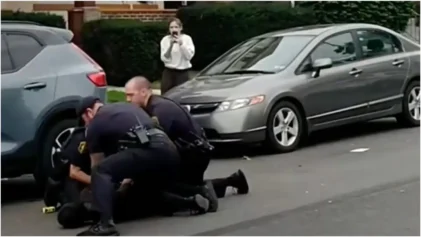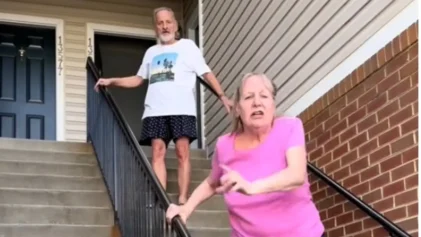Michigan’s high court will review two cases involving Black teens who were photographed and fingerprinted by police despite the fact they were never charged with crimes.
Justices will hear arguments in the coming months. They are expected to rule on whether the police actions violated constitutional safeguards against unreasonable searches and seizures, the Supreme Court announced recently.

The hearings will focus on two separate incidents in which Grand Rapids police stopped the teens, photographed them, then had them fingerprinted.
It was part of a longstanding practice of police “photographing and printing” people without ID, even when there was no evidence of criminal activity. It came to be known as the “P&P” policy, according to the teens’ attorneys from the American Civil Liberties Union.
“During each stop, the officers found nothing to confirm any suspicion that may have led
to the stops,” attorneys argued in the jointly filed petition in the two Black boys’ cases.
ACLU alleges the practice was unconstitutional and claims Grand Rapids PD used it on thousands of people every year. The organization filed for Michigan’s Supreme Court to hear both cases in February 2020.
“Taking the fingerprints and photographs of innocent Black youths and entering them into a police database is wrong and violates the Fourth Amendment,” Miriam Auckerman, a senior attorney for the American Civil Liberties Union of Michigan, said in a statement. “We are glad that the Michigan Supreme Court will review this dangerous policy which invades people’s privacy and encourages racial profiling.”
Denishio Johnson was 15 when officers encountered him cutting through the parking lot of a fitness club in 2011 and detained him. According to the legal complaint, there had been vehicle thefts in the parking lot. Police said Johnson fit the vague description of a suspect. But the alleged thief was reportedly described as a “Black man that was balding wearing a hood,” according to attorneys.
Witnesses claimed they saw Johnson looking through vehicles’ windows, but agreed he never tried to open any doors. Johnson told officers he was just looking at his reflection in the car windows.
Police detained him for 10 minutes, and confirmed that he had no warrants or previous arrests. Sgt. Elliot Bargas snapped a photo of Johnson and took a full set of fingerprints including his palm. He was then handcuffed and placed in the back of a police car. Police only released him from the scene after his mother identified him, according to the lawsuit.
Police considered Johnson a suspect in the previous break-ins at the parking lot and eventually processed his prints
A few months later in May 2012, police from the same department stopped 16-year-old Keyon Harrison as he was walking home from school with a classmate. Harrison was carrying the friend’s toy fire truck and handed it back to the friend when they separated. Grand Rapids Police Capt. Curt VanderKooi became suspicious when he saw the handoff. He stopped the teen and searched his backpack. Harrison told officers he was helping a friend carry the toy fire truck, which was part of an internship project. Another officer questioned the friend and their stories matched up.
Before releasing Harrison from the stop, VanderKooi said he needed the teen’s photograph and thumbprint “to make sure you are who you say you are,” according to his court petition. Harrison agreed and they attached the picture and print to an electronic copy of the incident report.
According to the lawsuit, students at Harrison’s school saw him being questioned by officers. He had to fend off rumors that he was involved in drugs, a robbery or may have shot someone.
Both men’s prints remain on file with the city.
Johnson and Harris filed separate lawsuits in 2014 against Grand Rapids and the police officers who stopped them. VanderKooi was named as a defendant in both suits, which were consolidated. The trial court ruled that Harrison’s stop was reasonable and not excessive, and noted VanderKooi got the teen’s permission to fingerprint and photograph him. They ruled that Johnson was in a public place and had no reasonable expectation of privacy.
“Therefore, Bargas did not violate the plaintiff’s Fourth Amendment rights when he executed the P&P,” the court ruled, adding, “even if the P&P was a search and seizure under the Fourth Amendment … Bargas’s actions were reasonable under the circumstances.”
The Grand Rapids Police Department changed its policy in 2015, after the lawsuits were dismissed, announcing that officers would only collect fingerprints from people without ID if their behavior was “highly suspicious,” Fox 17 reported.
In 2017, an appeals court upheld the ruling against Johnson and Harrison, determining that the city could not be held liable “because a policy that does not direct or require police officers to take a specific action cannot give rise to municipal liability.” Appellate judges did not, however, take up the question of whether the practice of officers photographing and fingerprinting the teens violated their Fourth Amendment constitutional rights.
The Michigan Supreme Court issued an opinion reversing the decision of the Court of Appeals in July 2018 and remanded the cases back to the appellate level. The appeals court doubled down on its decision in 2019, ruling in favor of the officers again.
Johnson and Harrison both appealed the decision, and the Court of Appeals denied their petitions in January 2020.
“Because fingerprinting is a search, it is unconstitutional when performed as part of a
‘Terry’ stop without probable cause,” the ACLU argued in their application to have the cases heard by the Supreme Court. “Warrantless searches are…unreasonable unless they fall
within narrowly defined exceptions, none of which apply here.”


